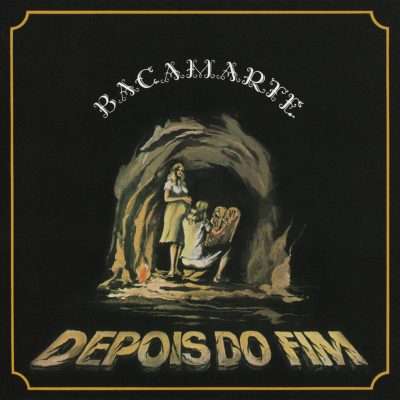Bacamarte – Depois do Fim (1983/2017)

Artist: Bacamarte
Album: Depois do Fim
Genre: Symphonic Prog
Label: Belle Antique
Year Of Release: 1983/2017
Quality: FLAC (image+.cue)
Tracklist:
1. UFO (6:26)
2. Smog Alado (4:11)
3. Miragem (4:54)
4. Pássaro de Luz (2:28)
5. Caño (1:59)
6. Último Entardecer (9:29)
7. Controvérsia (1:57)
8. Depois do Fim (6:31)
Personnel:
– Jane Duboc / vocals (2,4,6,8)
– Mário Neto / acoustic & electric guitars, producer & mixing
– Sergio Villarim / keyboards
– Marcus Moura / flutes, accordion
– Delto Simas / acoustic & electric basses
– Marco Veríssimo / drums
– Mr. Paul / percussion
“Depois Do Fim” is the debut studio album of Bacamarte and was released in 1983. The line up on the album is Jane Duboc, Mário Neto, Marcus Moura, Sérgio Vilarim, Delto Simas, Mr. Paul and Marco Verissimo.
The year was 1983, a time when the progressive rock music was considered by many specialists, dead. A track through the name’s appropriate disc for a situation called, “Depois Do Fim” (“After The End”), showed that perhaps a genre group had calmed down within England, its main redoubt bands of the so-called Neo-Prog genre. But bands from other countries would be producing excellent progressive works even in the 80’s, those troubled times for progressive rock.
Bacamarte was a progressive Brazilian rock band formed in 1974. Their work “Depois Do Fim” is considered by many as one of the best of progressive Brazilian rock albums, and it can be considered also as some of the best and most expressive creations of the main bands of the genre, like Pink Floyd, Jethro Tull, Yes, Genesis, Gentle Giant and Camel.
The band was formed by three colleagues from São José Marist College in Rio de Janeiro, but it underwent several changes occurred into their line up. They performed on the TV show Rock Concert. They recorded a demo tape, which was not approved by the record companies. In 1982, the group achieved prominences, with the emergence of Radio Fluminense FM and its policy of promoting new bands, launching the following year the album “Depis Do Fim”. The success, which made the group be consecrated in Europe and Japan, did not stop the band from ending in 1984.
The music of “Depois Do Fim” is rich and symphonic, with wonderful keyboards and an excellent flute that illuminates the compositions with full of pomp. The band has its biggest influence in the Italian school of the progressive rock, mirroring in bands like, Locanda Del Fate, Premiata Forneria Marconi and Quella Vecchia Locanda. Some tracks are instrumental while others feature some vocals in Portuguese, influenced by bands like Renaissance and Curved Air.
“Ufo” begins with a memorable performance of “Capricho Árabe”, a piece of the Spanish guitarist Francisco Tárrega, which soon becomes a complex progressive song. “Smog Alado” is the track that metaphorically begins the story told on the album, the Apocalypse, and it shows the progressive influences of the band. Jane’s vocals appear in a kind of Renaissance mood. The final is very symphonic and captivating. “Miragem” opens with some eastern sounds, soon replaced by acid guitars, until a flute is added giving a delicious sensation. The previous guitar rhythm returns until the song reaches its end. “Pássaro De Luz” has some of the best lyrics. It’s slow and is very well played on guitar. It’s especially made for Jane’s voice and the overall feel is childish and dreamy. On it, Jane has her best moment on the album. It’s really impressive the range of her voice. “Caño” is a very short track. It’s time for musicians showing their skills a bit. The song could be a little bit longer but the final result is quite good. “Ùltimo Entardecer” could be divided into three suites, as we hear three distinct parts. It brings nice synthesizers, beautiful guitar passages and wonderful piano. Jane’s vocals appear as if announcing a dialogue between the instruments. It brings back the symphonic trend, sounding like a sort of epic medium, accompanied by philosophical lyrics about death, madness, fear and hope. Here we have the imminent moment of the Apocalypse, which is revealed in its prophetic lyrics. “Controvérsia” opens with a notorious bossa-nova beat, followed by a sonic alchemy that bears resemblance to a jam session. It gives us a feeling of being a pure-filling material on the album. “Depois Do Fim” is purely symphonic. The ambient created by the music is obscure, vocals are dark, and the instrumentation is precious, energetic, well according to the theme, the possible end of time, the apocalypse. The track shows us how the Earth would look after the end of the Apocalypse. “Mirante Das Estrelas” is an instrumental bonus track. It fits well because it sums up the entire contents of the album, piece by piece. It’s like a puzzle being solved. All the melodies and chords heard throughout the album are harmoniously and divinely revived. The melancholy and sad part near the end of the track brings us the ending in a tone of serenity and peace.
Conclusion: “Depois Do Fim” is a real jewel, especially for the progressive rock lovers. This is probably the album that best represents Brazil within the foreign critic when it comes to the genre. The majority of the tracks are instrumental. They live mainly on the variations of the bandleader Neto, who together with keyboardist Vilarim and the flautist Moura, are the defining elements in the music of Bacamarte. Singer Jane, with expressive singing in higher regions will be able to contribute, creating a mix of styles that is very close to the Spanish and Italian 70’s bands. Meanwhile, in the 90’s guitarist Neto released the album “Sete Cidades”, with the codename Bacamarte on the cover. As he was the founder and main composer of the band, many people accept it as a second album of the band, although in practice it’s not.
Review by e210013, sputnikmusic



